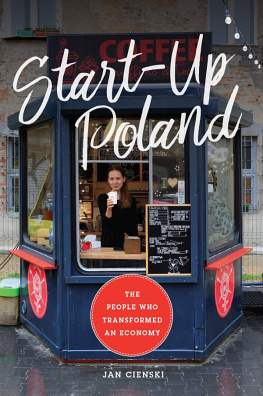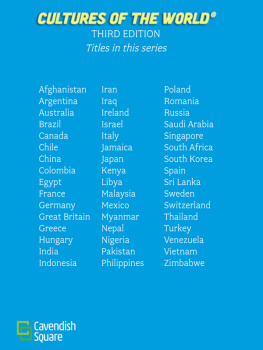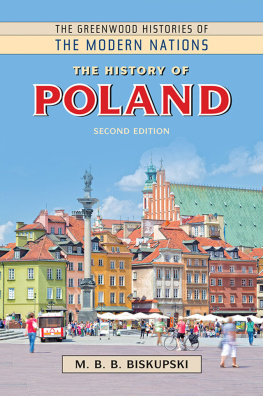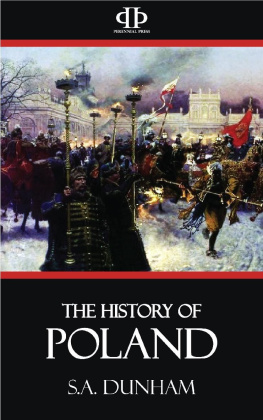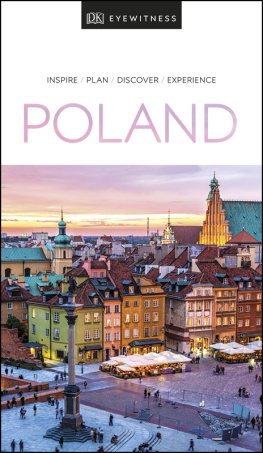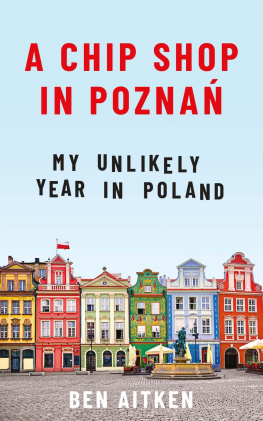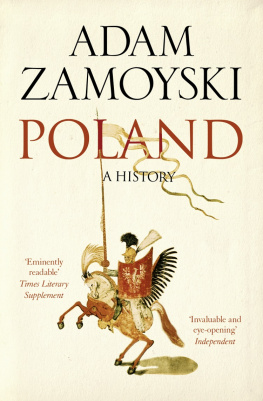Cieński - Start-up Poland: the people who transformed an economy
Here you can read online Cieński - Start-up Poland: the people who transformed an economy full text of the book (entire story) in english for free. Download pdf and epub, get meaning, cover and reviews about this ebook. City: Chicago;London, year: 2018, publisher: The University of Chicago Press, genre: Politics. Description of the work, (preface) as well as reviews are available. Best literature library LitArk.com created for fans of good reading and offers a wide selection of genres:
Romance novel
Science fiction
Adventure
Detective
Science
History
Home and family
Prose
Art
Politics
Computer
Non-fiction
Religion
Business
Children
Humor
Choose a favorite category and find really read worthwhile books. Enjoy immersion in the world of imagination, feel the emotions of the characters or learn something new for yourself, make an fascinating discovery.
Start-up Poland: the people who transformed an economy: summary, description and annotation
We offer to read an annotation, description, summary or preface (depends on what the author of the book "Start-up Poland: the people who transformed an economy" wrote himself). If you haven't found the necessary information about the book — write in the comments, we will try to find it.
Cieński: author's other books
Who wrote Start-up Poland: the people who transformed an economy? Find out the surname, the name of the author of the book and a list of all author's works by series.
Start-up Poland: the people who transformed an economy — read online for free the complete book (whole text) full work
Below is the text of the book, divided by pages. System saving the place of the last page read, allows you to conveniently read the book "Start-up Poland: the people who transformed an economy" online for free, without having to search again every time where you left off. Put a bookmark, and you can go to the page where you finished reading at any time.
Font size:
Interval:
Bookmark:
Jan Cienski
THE UNIVERSITY OF CHICAGO PRESS
Chicago and London
The University of Chicago Press, Chicago 60637
The University of Chicago Press, Ltd., London
2018 by The University of Chicago
All rights reserved. No part of this book may be used or reproduced in any manner whatsoever without written permission, except in the case of brief quotations in critical articles and reviews. For more information, contact the University of Chicago Press, 1427 E. 60th St., Chicago, IL 60637.
Published 2018
Printed in the United States of America
27 26 25 24 23 22 21 20 19 18 1 2 3 4 5
ISBN-13: 978-0-226-30681-0 (cloth)
ISBN-13: 978-0-226-30695-7 (e-book)
DOI: 10.7208/chicago/9780226306957.001.0001
Library of Congress Cataloging-in-Publication Data
Names: Cienski, Jan, author.
Title: Start-up Poland : the people who transformed an economy / Jan Cienski.
Description: Chicago : The University of Chicago Press, 2017. | Includes bibliographical references and index.
Identifiers: LCCN 2017025013 | ISBN 9780226306810 (cloth : alk. paper) | ISBN 9780226306957 (e-book)
Subjects: LCSH: EntrepreneurshipPolandHistory20th century. | EntrepreneurshipPolandHistory21st century. | BusinesspeoplePoland. | PolandEconomic conditions1990 | Post-communismEconomic aspectsPoland.
Classification: LCC HC340.3 .C55 2017 | DDC 338.092/2438dc23
LC record available at https://lccn.loc.gov/2017025013
 This paper meets the requirements of ANSI / NISO Z39.481992 (Permanence of Paper).
This paper meets the requirements of ANSI / NISO Z39.481992 (Permanence of Paper).
For Cecelia... obviously
Lech Wasa is an old man now. His walrus moustache is gray, and his belly strains against his shirt as he sits heavily in a worn armchair and again launches into the story of how he helped lead the Solidarity labor union to victory against the communist regimesetting off a wave of revolutions across Central Europe in 1989 that brought an end to more than four decades of Soviet power in the region.
But there is a little of the old sparkle in his tale of how workers allied with intellectuals to restore Polands independence more than a quarter-century ago.
Thats because Wasa is fighting again. Hes trying to lead a citizens movement against the right-wing populist Law and Justice Party government that won power in 2015. Hes traveling to towns across Poland, hoping to organize a referendum aimed at curtailing the governments powera response to Law and Justices attacks on the countrys top constitutional court, its seizure of the public media, and its brawls with the European Union and close allies like the United States.
Theres going to be an ultimatum. Either you agree to democratic solutions, or else well help you jump out the window, Wasa said, sitting in his office in the European Solidarity Center, a museum in the port city of Gdask overlooking the gates of the old Lenin Shipyard, where Wasa led the 1980 strike that created Solidarity.
The new government has made Wasa a target. Instead of a national hero, winner of the Nobel Peace Prize, and Polands first postwar noncommunist president, hes seen as a traitor. The progovernment media attack him as a communist stooge, recalling his instances of cooperation with the secret police in the early 1970s, after the bloody suppression of a shipyard strike in 1970.
Wasas greatest success came in 1989, when he led careful negotiations with the still powerful communists that allowed for partly free parliamentary elections. The communists were humiliated in the polls, and by August of that year, Poland had its first noncommunist prime minister since World War II. That allowed for a scrapping of the ludicrous economic policies foisted on Poland by Moscow, and the start of a capitalist revolution.
The decades since then turned Poland from a basket case into one of Europes fastest-growing countriesa tiger economy on a continent more used to sluggish growth and sky-high unemployment. A key role in that transformation was played by entrepreneurs, people who built businesses that made Poland a power in everything from cosmetics to bus and train construction. Poland became a poster child for capitalism, an example of one of the worlds most successful postcommunist transformations.
During the depths of the 20089 global financial crisis, the government of the day relished showing colorful maps of the European Union, with every country in red thanks to their deep recessions, and only Poland in greenthe sole EU country to emerge from that slump without suffering a contraction.
But the new narrative of the Law and Justice government is very different. Its leader, Jarosaw Kaczyskian old enemy of Wasasees 1989 not as an astonishing achievement, but rather as a failure, something that left Poland in ruins and under the control of foreign bankers, rapacious investors, and deeply dishonest local businessmen who have more in common with gangsters than with entrepreneurs.
Todays Poland is saddled with the errors of communism, Kaczyski said recently. The shock of a socialist society, which had been horribly mistreated by the war, encountering liberal permissiveness containing elements of social Darwinismthe idea that whoever is stronger is better, and those who fail are at faultis very harmful.
Kaczyski and Law and Justice won presidential and parliamentary elections in 2015 by tapping into a broad current of discontent among many Poles who felt they hadnt enjoyed the fruits of the countrys economic success. Helped by a generous welfare program promising to pay a child bonus to every family with two or more children and to roll back increases in the retirement age, the party romped to spectacular victories.
By early 2016, several leading businessmen faced criminal charges, and the heads of almost all state-controlled companies had been purged.
Even Wasa now recognizes that the earlier rah-rah vision of Polands success left out a lot of people: especially the old, who had a hard time figuring out how to adapt to the more cutthroat world of capitalism; the badly educated; and those formerly employed by large state-owned companies and farms. Also, many socially conservative Poles proved increasingly uncomfortable with their countrys rapid transformation into a mainstream European nation, a place where gays were increasingly comfortable, where the Roman Catholic Churchs authority was dwindling, and where people were more interested in making their mortgage payments and getting a promotion at work than in extolling the patriotic heroes of the past.
Over the last twenty-five years we did as well as we could, Wasa said. But while we were building a new Polandall those roads and investmentswe forgot about the people. We should have helped them more.
While a recalibration of the social costs of Polands transformation might be in order, theres no escaping the fact that Poland has undergone one of the worlds most striking and successful changes. Everything from roads to cars to houses to take-home income is completely different than in 1989and the largest part of that achievement is due to the work of entrepreneurs.
Thats a controversial thesis in todays Poland; but controversial or not, the story is true.
In 1987, Zbigniew Sosnowski was working as a car mechanic in the unremarkable central Polish town of Przasnysz, fixing the rattling rust buckets produced by Polish auto plants which were so badly built they often needed to be repaired immediately after rolling off the production line.
At about the same time, Andrzej Blikle was studying the mathematics of computer programming at the Polish Academy of Sciences. Leszek Czarnecki was running a small commercial diving company in western Poland. Dariusz Miek was sweating out wins on the international bicycle racing circuitpromptly taking the crystal trophies and, instead of parking them on a shelf, selling them to bemused French and Italian villagers.
Font size:
Interval:
Bookmark:
Similar books «Start-up Poland: the people who transformed an economy»
Look at similar books to Start-up Poland: the people who transformed an economy. We have selected literature similar in name and meaning in the hope of providing readers with more options to find new, interesting, not yet read works.
Discussion, reviews of the book Start-up Poland: the people who transformed an economy and just readers' own opinions. Leave your comments, write what you think about the work, its meaning or the main characters. Specify what exactly you liked and what you didn't like, and why you think so.

